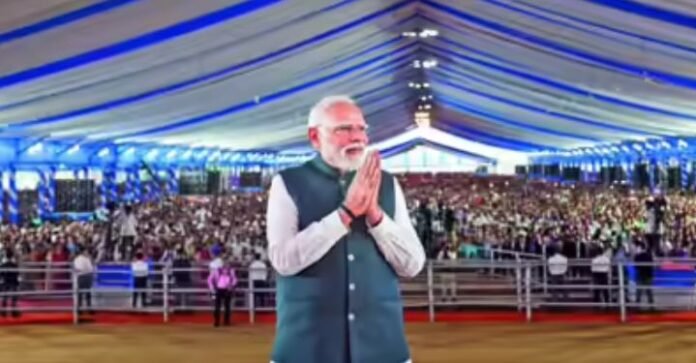The Indian National Congress has raised serious concerns over what it calls a growing trend of “state-sponsored glorification” of Prime Minister Narendra Modi, allegedly involving schoolchildren across various states. The opposition party alleges that directives were issued to educational institutions asking children to participate in events glorifying the Prime Minister in the lead-up to his birthday on September 17. The Congress claims that the government is politicising education and misusing public institutions for personal image-building.
Congress’s Core Allegation
On September 16, senior Congress spokespersons alleged that schools — especially government-run ones — were “coerced” into organising programs such as essay competitions, song performances, and exhibitions that highlight the Prime Minister’s achievements and personality. They pointed to reports from states such as Gujarat, Uttar Pradesh, and Madhya Pradesh where schoolchildren were allegedly instructed to perform special acts in honour of PM Modi, sometimes without parental consent.
“Children are not tools for political propaganda,” said Congress MP and media head Jairam Ramesh. “This is a dangerous and unethical attempt to indoctrinate impressionable minds. We are witnessing the rise of a personality cult, and that too at the expense of our education system’s integrity.”
The party also circulated images and videos from some schools where students were seen holding placards with Modi’s photograph and reciting poems about his life and work.
Educational Institutions and Government Response
Officials from the Ministry of Education have not confirmed the issuance of any such directive at the national level. When contacted by media, some state education departments described the school activities as “voluntary cultural initiatives” and denied any political intent.
A senior education official in Gujarat said, “These programs are meant to foster leadership ideals and patriotic values. There is no compulsion, and schools have the autonomy to decide how to observe important national days.”
However, several teacher unions and parent groups have expressed discomfort with the alleged use of children in political messaging. Some schoolteachers, speaking anonymously, said they were “verbally advised” by local authorities to organise events “in honour of the PM,” which created pressure to comply, even if unofficial.
Congress Cites Pattern of Political Overreach
Congress leaders claim that this is not an isolated incident, but part of a broader pattern. They cite previous examples where the Prime Minister’s image was allegedly inserted into academic programs, government schemes, or public messaging — including promotional materials for welfare schemes like PM-KISAN or PM-Awas Yojana.
“Every textbook, every ration card, every banner has the PM’s photo. Now even school programs are being turned into PR exercises. This is not nation-building — this is self-promotion,” said Congress MP Karti Chidambaram on social media platform X (formerly Twitter).
The Congress party has also pointed to earlier incidents where children were featured in election campaign videos or were seen chanting political slogans in rallies — something that the National Commission for Protection of Child Rights (NCPCR) has previously warned against.
Legal and Ethical Dimensions
India’s laws prohibit the use of children in political campaigns or any form of coercion that violates their rights to free thought and education. The Right to Education Act and UN Convention on the Rights of the Child, to which India is a signatory, both emphasise the need for schools to remain apolitical and protect children from ideological manipulation.
Child rights experts argue that even if events praising the Prime Minister are framed as “voluntary,” the power dynamics in schools make such participation hard to resist — particularly when teachers and administrators are under pressure.
“Children often cannot distinguish between patriotic duty and political messaging,” said Dr. Vandana Sharma, a Delhi-based child psychologist. “When they’re told to recite poems about a political leader, it becomes a form of indoctrination, whether intended or not.”
Opposition Demands Investigation
Congress has called for an immediate inquiry by the Election Commission, Ministry of Education, and NCPCR into the alleged use of children for political glorification. The party wants any existing directives withdrawn, and a formal assurance from the government that such events will not be repeated in future.
“If any circulars have gone out, they should be made public,” said Congress leader Pawan Khera. “Transparency is essential. If these events are truly voluntary, then why are so many teachers reporting informal pressure to participate?”
The party also suggested that Parliament should debate the increasing politicisation of education and the growing centralisation of narrative around one individual.
Wider Public Reactions
Public opinion remains divided. Supporters of the ruling BJP argue that highlighting the achievements of a sitting Prime Minister is no different from what has been done historically for other leaders, including Jawaharlal Nehru and Indira Gandhi. They claim that the opposition is overreacting to benign cultural activities.
“It’s part of civic education. Children should know who their leaders are,” said BJP spokesperson Shehzad Poonawalla in a televised interview. “Congress did this for decades with their own leaders. Now they are uncomfortable seeing the people genuinely admire PM Modi.”
Critics, however, insist that this is qualitatively different. “This isn’t education — it’s branding,” said a Delhi parent whose child attends a government school. “They are not teaching about governance or democracy. They are teaching blind admiration.”
What’s at Stake
The controversy strikes at the heart of an ongoing debate in Indian democracy: the role of political figures in public institutions. As elections draw closer, and public spaces — from ration shops to classrooms — increasingly carry the imprint of the Prime Minister, questions of boundaries, legality, and ethics are becoming more urgent.
For now, Congress’s charge may not lead to immediate policy change, but it has reignited a conversation about the appropriate limits of political influence in education. Whether the government chooses to issue clarifications or continues with such programs will shape not only public opinion but potentially the educational experience of millions of children across the country.

